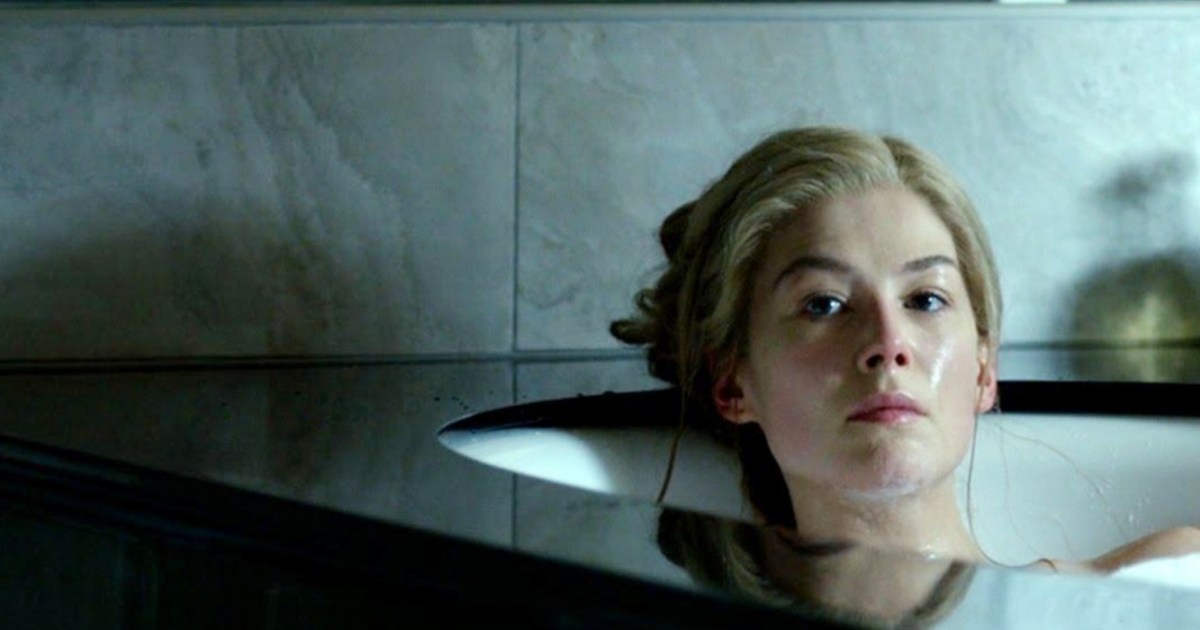The first ingenious choice David Fincher made in his adaptation of Gone Girl was to cast Ben Affleck as Nick Dunne, the stalled writer and deadbeat husband who discovers his wife, Amy, has disappeared on their wedding anniversary. Or does he know more than he’s letting on? Affleck, then in his early ’40s, still had the square-jawed good looks that landed him an ill-fated turn in the cape and cowl that same year. But showbiz had been a roller coaster for the actor — a series of highs and lows, of Oscar glory and very public romantic folly, of big paychecks and talk-show punch lines. Even before candid photos of him in a beach towel ignited memes and talk of the “great sadness of Ben Affleck,” this star seemed ideally suited to his role. We could easily buy him as both a charming womanizer and a washed-up lug blinded by the flashing lights of the paparazzi.
Right from its overcast opening scenes, Gone Girl has begun toying with such associations, along with our sympathies and our assumptions. This outrageously entertaining missing-person mystery, which hit multiplexes 10 years ago, might be Fincher’s most Hitchcockian movie — and that’s really saying something about the guy whose masterpiece is a Bay Area study of obsession, a Vertigo for a new age of information rabbit holes. Gone Girl gives us an icy blonde, a wrong man who might actually be the right man, and a twist nearly as monumental as what happened to Marion Crane in the shower. (It arrives, incidentally, about 40% through — around the same point in the runtime as Psycho’s big pivot.)
Is there any contemporary filmmaker of Fincher’s status who seems more at home making populist pulp? His toniest projects, like Mank or The Curious Case of Benjamin Button, are his least satisfying. Gone Girl, by contrast, is comfortable playing to the cheap seats and the beach-read crowd. It was Fincher’s second consecutive hit adapted from what you could call an airport bestseller. And if the previous one, The Girl with the Dragon Tattoo, was thrilling almost in spite of its preposterous page-turner plotting, Gone Girl is a more perfect union of sleek style and seedy substance. It helps that the source material is better, and that screenwriter Gillian Flynn found a way to preserve the dueling perspectives of her 2012 novel while jettisoning one half of the he said, she said narration.

Casting is crucial to the film’s ambiguous balance. If Fincher capitalized on the baggage Affleck carried, he also exploited the lack of a relationship audiences might have had to his co-star, the then much-less-famous Rosamund Pike. Her lower profile was perfect for the role of a human question mark. (It’s one reason Reese Witherspoon, who secured the rights to Flynn’s novel with the plan to star, would have been all wrong for Amy Dunne.) Pike’s spooky performance, which landed Gone Girl its only Oscar nomination, keeps complicating our notions of who Amy might be. The more time we spend with her, through glimpses back into her troubled marriage (and through the dark places the plot goes in its second half), the less we know her.
It’s weird that the Academy didn’t fall harder for this acclaimed, popular literary adaptation, the kind of smart commercial thriller that should be a Best Picture no-brainer. Maybe the movie was too proudly sensationalistic — or too trashy, to paraphrase many of the objecting reviews — even for a voting group that celebrated Fatal Attraction three decades earlier. Fincher satirizes the culture of tabloid vultures while thirstily drinking in the scandalous melodrama and button-pressing provocations of the story. He also embraces the withering cynicism of Flynn’s novel: For such a juicy mainstream entertainment, the film ends on a truly pessimistic note, an anti-happy ending awash in the sinister, almost Twin Peaksian romantic ambiance of Atticus Ross and Trent Reznor’s misleadingly soothing score.

On the page, Gone Girl was a gift to the think-piece industrial complex, inspiring its share of controversy and discourse. Was the author slyly winking at misogynistic stereotypes or merely reinforcing them? Did her twists and turns harmfully perpetuate dangerous narratives about rape? Gone Girl risks outrage in following characters all too willing to conform to (and exploit) social notions of gender. One pitiless irony is that even the famous “cool girl” monologue, a speech decrying the expectations put on women, is a kind of deception. It righteously recalibrates our allegiances, right before Flynn reveals deeper depths of depravity underneath the applause-courting indignation of her heroine.
Fincher’s sleek procedural style — his eye for detail, the clarity and forward momentum of his montage — gives Gone Girl the organized, logical flow of true crime. But that can’t be trusted either. Any viewer who mistakes the flashbacks for crucial context or a trail of breadcrumbs is falling right into a trap laid by the film and its characters. Nick and Amy, as we at last come to understand, are not who they claim to be; they have been performing from the start — for the outside world, for each other, maybe for themselves. In that respect, the film’s audience surrogate (and the closest Flynn comes to a voice of moral reason) is a neutral party just trying to keep up: the detective played by Kim Dickens, whose shifting suspicions mirror those of any viewer trying to get ahead of the mystery when going in cold.
Because of his famed perfectionism — demanding dozens of takes, composing shots so carefully they can be reframed in postproduction — David Fincher has sometimes been called the 21st-century heir to Stanley Kubrick. Gone Girl has an explicit touch of Kubrick via scenes set in a stylized Manhattan that brings to mind the similarly unreal, snow-caked New York City of Eyes Wide Shut, another thriller about the enigma of marriage. But it’s the round silhouette of Hitchcock, again, that falls over the movie; like Hitch, Fincher is a technical genius who specializes in neurotic thrillers, in diabolical pranks on the audience, in mainstream movies as demented in their psychology as they are slickly entertaining. Hitchcock used to say that he made not slices of life, but slices of cake. Gone Girl is that sort of confection, so delectable you don’t mind the arsenic baked in.
Gone Girl is available to rent or purchase from the major digital services. For more of A.A. Dowd’s writing, visit his Authory page.
Read the full article here













